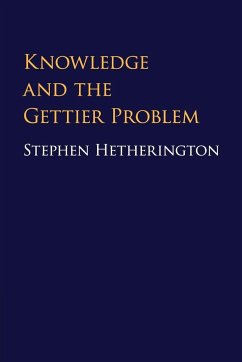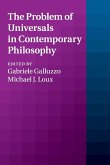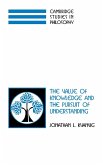Stephen Hetherington
Knowledge and the Gettier Problem
Stephen Hetherington
Knowledge and the Gettier Problem
- Broschiertes Buch
- Merkliste
- Auf die Merkliste
- Bewerten Bewerten
- Teilen
- Produkt teilen
- Produkterinnerung
- Produkterinnerung
This book enriches our understanding of knowledge and Gettier's challenge, stimulating debate on a central epistemological issue.
Andere Kunden interessierten sich auch für
![Knowledge and the Gettier Problem Knowledge and the Gettier Problem]() Stephen HetheringtonKnowledge and the Gettier Problem111,99 €
Stephen HetheringtonKnowledge and the Gettier Problem111,99 €![The Gettier Problem The Gettier Problem]() The Gettier Problem100,99 €
The Gettier Problem100,99 €![The Problem of Universals in Contemporary Philosophy The Problem of Universals in Contemporary Philosophy]() The Problem of Universals in Contemporary Philosophy33,99 €
The Problem of Universals in Contemporary Philosophy33,99 €![The Morality of Knowledge in Conversation The Morality of Knowledge in Conversation]() The Morality of Knowledge in Conversation39,99 €
The Morality of Knowledge in Conversation39,99 €![The Value of Knowledge and the Pursuit of Understanding The Value of Knowledge and the Pursuit of Understanding]() Jonathan L. KvanvigThe Value of Knowledge and the Pursuit of Understanding104,99 €
Jonathan L. KvanvigThe Value of Knowledge and the Pursuit of Understanding104,99 €![An Introduction to the Theory of Knowledge An Introduction to the Theory of Knowledge]() Noah LemosAn Introduction to the Theory of Knowledge100,99 €
Noah LemosAn Introduction to the Theory of Knowledge100,99 €![The Problem of Universals in Contemporary Philosophy The Problem of Universals in Contemporary Philosophy]() The Problem of Universals in Contemporary Philosophy108,99 €
The Problem of Universals in Contemporary Philosophy108,99 €-
-
-
This book enriches our understanding of knowledge and Gettier's challenge, stimulating debate on a central epistemological issue.
Hinweis: Dieser Artikel kann nur an eine deutsche Lieferadresse ausgeliefert werden.
Hinweis: Dieser Artikel kann nur an eine deutsche Lieferadresse ausgeliefert werden.
Produktdetails
- Produktdetails
- Verlag: Cambridge University Press
- Seitenzahl: 254
- Erscheinungstermin: 18. September 2018
- Englisch
- Abmessung: 229mm x 152mm x 14mm
- Gewicht: 374g
- ISBN-13: 9781316603970
- ISBN-10: 1316603970
- Artikelnr.: 54849796
- Herstellerkennzeichnung
- Libri GmbH
- Europaallee 1
- 36244 Bad Hersfeld
- gpsr@libri.de
- Verlag: Cambridge University Press
- Seitenzahl: 254
- Erscheinungstermin: 18. September 2018
- Englisch
- Abmessung: 229mm x 152mm x 14mm
- Gewicht: 374g
- ISBN-13: 9781316603970
- ISBN-10: 1316603970
- Artikelnr.: 54849796
- Herstellerkennzeichnung
- Libri GmbH
- Europaallee 1
- 36244 Bad Hersfeld
- gpsr@libri.de
Stephen Hetherington is Professor of Philosophy at the University of New South Wales, Sydney. His publications include Epistemology's Paradox (1992), Good Knowledge, Bad Knowledge (2001) and How To Know (2011).
Part I. Introducing Gettierism: 1.1. The year of Gettier
1.2. Gettierism introduced
1.3. Gettier cases introduced
1.4. Gettierism refined
1.5. Gettierism finalised: individual-Gettierism versus property-Gettierism
1.6. Gettieristic responses to Gettier cases
1.7. Supporting Gettierism
Part II. Explicating Gettierism: A General Challenge: 2.1. Introduction
2.2. The fallibilism underlying Gettierism
2.3. A general anti-Gettierism argument
2.3.1. The strategy
2.3.2. The argument
2.3.3. Objection: merely definitional?
Part III. Explicating Gettierism: A Case Study: 3.1. Introduction
3.2 Veritic luck
3.3. The argument
3.4. The argument, more metaphysically
3.5. An alternative Gettieristic interpretation of safety?
3.6. Belief-forming methods
3.7. The backward clock
3.8. The anti-luck intuition supplanted
Part IV. Explicating Gettierism: Modality and Properties: 4.1. Introduction
4.2. Objection: modal fallacy?
4.2.1. The objection
4.2.2. The property of being Gettiered
4.2.3. Property preclusion
4.2.4. Predicates for the property of being Gettiered
4.2.5. Property analysis
4.3. Objection: another modal fallacy?
4.3.1. The objection
4.3.2. The objection's failure
4.3.3. Individual-Gettierism versus property-Gettierism, again
Part V. Explicating Gettierism: Infallibility Presuppositions: 5.1. A question
5.2. Some Gettieristic reasoning
5.3. Realistic possibilities?
5.4. A case study: virtue-theoretic manifestation
5.4.1. Sosa/Turri's Gettieristic proposal
5.4.2. Fallibilism within Gettier's challenge
5.4.3. Turri's unwitting infallibilism
5.4.4. A methodological moral
5.4.5. Manifestation clarified
5.5. Conclusion
Part VI. Gettierism and its Intuitions: 6.1. Intuitive support?
6.2. Gettier's fallibilism, again
6.3. A methodological moral, again
6.4. A methodological question about Gettieristic assessments
6.5. A methodological problem for Gettieristic assessments
6.6. An objection and two replies
6.7. Conclusion
Part VII. Gettierism Improved: 7.1. A compatibilist aim
7.2. An old-fashioned account of not being Gettiered
7.2.1. An internalist condition
7.2.2. A fallibilist condition
7.2.3. A non-reductive condition
7.3. A non-reductive justified-true-belief conception of knowledge.
1.2. Gettierism introduced
1.3. Gettier cases introduced
1.4. Gettierism refined
1.5. Gettierism finalised: individual-Gettierism versus property-Gettierism
1.6. Gettieristic responses to Gettier cases
1.7. Supporting Gettierism
Part II. Explicating Gettierism: A General Challenge: 2.1. Introduction
2.2. The fallibilism underlying Gettierism
2.3. A general anti-Gettierism argument
2.3.1. The strategy
2.3.2. The argument
2.3.3. Objection: merely definitional?
Part III. Explicating Gettierism: A Case Study: 3.1. Introduction
3.2 Veritic luck
3.3. The argument
3.4. The argument, more metaphysically
3.5. An alternative Gettieristic interpretation of safety?
3.6. Belief-forming methods
3.7. The backward clock
3.8. The anti-luck intuition supplanted
Part IV. Explicating Gettierism: Modality and Properties: 4.1. Introduction
4.2. Objection: modal fallacy?
4.2.1. The objection
4.2.2. The property of being Gettiered
4.2.3. Property preclusion
4.2.4. Predicates for the property of being Gettiered
4.2.5. Property analysis
4.3. Objection: another modal fallacy?
4.3.1. The objection
4.3.2. The objection's failure
4.3.3. Individual-Gettierism versus property-Gettierism, again
Part V. Explicating Gettierism: Infallibility Presuppositions: 5.1. A question
5.2. Some Gettieristic reasoning
5.3. Realistic possibilities?
5.4. A case study: virtue-theoretic manifestation
5.4.1. Sosa/Turri's Gettieristic proposal
5.4.2. Fallibilism within Gettier's challenge
5.4.3. Turri's unwitting infallibilism
5.4.4. A methodological moral
5.4.5. Manifestation clarified
5.5. Conclusion
Part VI. Gettierism and its Intuitions: 6.1. Intuitive support?
6.2. Gettier's fallibilism, again
6.3. A methodological moral, again
6.4. A methodological question about Gettieristic assessments
6.5. A methodological problem for Gettieristic assessments
6.6. An objection and two replies
6.7. Conclusion
Part VII. Gettierism Improved: 7.1. A compatibilist aim
7.2. An old-fashioned account of not being Gettiered
7.2.1. An internalist condition
7.2.2. A fallibilist condition
7.2.3. A non-reductive condition
7.3. A non-reductive justified-true-belief conception of knowledge.
Part I. Introducing Gettierism: 1.1. The year of Gettier
1.2. Gettierism introduced
1.3. Gettier cases introduced
1.4. Gettierism refined
1.5. Gettierism finalised: individual-Gettierism versus property-Gettierism
1.6. Gettieristic responses to Gettier cases
1.7. Supporting Gettierism
Part II. Explicating Gettierism: A General Challenge: 2.1. Introduction
2.2. The fallibilism underlying Gettierism
2.3. A general anti-Gettierism argument
2.3.1. The strategy
2.3.2. The argument
2.3.3. Objection: merely definitional?
Part III. Explicating Gettierism: A Case Study: 3.1. Introduction
3.2 Veritic luck
3.3. The argument
3.4. The argument, more metaphysically
3.5. An alternative Gettieristic interpretation of safety?
3.6. Belief-forming methods
3.7. The backward clock
3.8. The anti-luck intuition supplanted
Part IV. Explicating Gettierism: Modality and Properties: 4.1. Introduction
4.2. Objection: modal fallacy?
4.2.1. The objection
4.2.2. The property of being Gettiered
4.2.3. Property preclusion
4.2.4. Predicates for the property of being Gettiered
4.2.5. Property analysis
4.3. Objection: another modal fallacy?
4.3.1. The objection
4.3.2. The objection's failure
4.3.3. Individual-Gettierism versus property-Gettierism, again
Part V. Explicating Gettierism: Infallibility Presuppositions: 5.1. A question
5.2. Some Gettieristic reasoning
5.3. Realistic possibilities?
5.4. A case study: virtue-theoretic manifestation
5.4.1. Sosa/Turri's Gettieristic proposal
5.4.2. Fallibilism within Gettier's challenge
5.4.3. Turri's unwitting infallibilism
5.4.4. A methodological moral
5.4.5. Manifestation clarified
5.5. Conclusion
Part VI. Gettierism and its Intuitions: 6.1. Intuitive support?
6.2. Gettier's fallibilism, again
6.3. A methodological moral, again
6.4. A methodological question about Gettieristic assessments
6.5. A methodological problem for Gettieristic assessments
6.6. An objection and two replies
6.7. Conclusion
Part VII. Gettierism Improved: 7.1. A compatibilist aim
7.2. An old-fashioned account of not being Gettiered
7.2.1. An internalist condition
7.2.2. A fallibilist condition
7.2.3. A non-reductive condition
7.3. A non-reductive justified-true-belief conception of knowledge.
1.2. Gettierism introduced
1.3. Gettier cases introduced
1.4. Gettierism refined
1.5. Gettierism finalised: individual-Gettierism versus property-Gettierism
1.6. Gettieristic responses to Gettier cases
1.7. Supporting Gettierism
Part II. Explicating Gettierism: A General Challenge: 2.1. Introduction
2.2. The fallibilism underlying Gettierism
2.3. A general anti-Gettierism argument
2.3.1. The strategy
2.3.2. The argument
2.3.3. Objection: merely definitional?
Part III. Explicating Gettierism: A Case Study: 3.1. Introduction
3.2 Veritic luck
3.3. The argument
3.4. The argument, more metaphysically
3.5. An alternative Gettieristic interpretation of safety?
3.6. Belief-forming methods
3.7. The backward clock
3.8. The anti-luck intuition supplanted
Part IV. Explicating Gettierism: Modality and Properties: 4.1. Introduction
4.2. Objection: modal fallacy?
4.2.1. The objection
4.2.2. The property of being Gettiered
4.2.3. Property preclusion
4.2.4. Predicates for the property of being Gettiered
4.2.5. Property analysis
4.3. Objection: another modal fallacy?
4.3.1. The objection
4.3.2. The objection's failure
4.3.3. Individual-Gettierism versus property-Gettierism, again
Part V. Explicating Gettierism: Infallibility Presuppositions: 5.1. A question
5.2. Some Gettieristic reasoning
5.3. Realistic possibilities?
5.4. A case study: virtue-theoretic manifestation
5.4.1. Sosa/Turri's Gettieristic proposal
5.4.2. Fallibilism within Gettier's challenge
5.4.3. Turri's unwitting infallibilism
5.4.4. A methodological moral
5.4.5. Manifestation clarified
5.5. Conclusion
Part VI. Gettierism and its Intuitions: 6.1. Intuitive support?
6.2. Gettier's fallibilism, again
6.3. A methodological moral, again
6.4. A methodological question about Gettieristic assessments
6.5. A methodological problem for Gettieristic assessments
6.6. An objection and two replies
6.7. Conclusion
Part VII. Gettierism Improved: 7.1. A compatibilist aim
7.2. An old-fashioned account of not being Gettiered
7.2.1. An internalist condition
7.2.2. A fallibilist condition
7.2.3. A non-reductive condition
7.3. A non-reductive justified-true-belief conception of knowledge.








